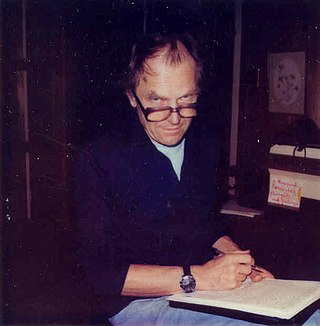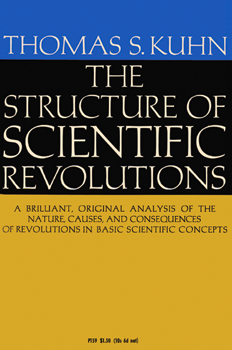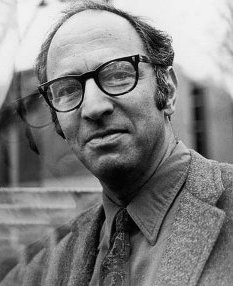
Falsifiability is a deductive standard of evaluation of scientific theories and hypotheses, introduced by the philosopher of science Karl Popper in his book The Logic of Scientific Discovery (1934). A theory or hypothesis is falsifiable if it can be logically contradicted by an empirical test.

Sir Karl Raimund Popper was an Austrian–British philosopher, academic and social commentator. One of the 20th century's most influential philosophers of science, Popper is known for his rejection of the classical inductivist views on the scientific method in favour of empirical falsification. According to Popper, a theory in the empirical sciences can never be proven, but it can be falsified, meaning that it can be scrutinised with decisive experiments. Popper was opposed to the classical justificationist account of knowledge, which he replaced with critical rationalism, namely "the first non-justificational philosophy of criticism in the history of philosophy".

Logical positivism, later called logical empiricism, and both of which together are also known as neopositivism, is a movement whose central thesis is the verification principle. This theory of knowledge asserts that only statements verifiable through direct observation or logical proof are meaningful in terms of conveying truth value, information or factual content. Starting in the late 1920s, groups of philosophers, scientists, and mathematicians formed the Berlin Circle and the Vienna Circle, which, in these two cities, would propound the ideas of logical positivism.

Philosophy of science is a branch of philosophy concerned with the foundations, methods, and implications of science. The central questions of this study concern what qualifies as science, the reliability of scientific theories, and the ultimate purpose of science. This discipline overlaps with metaphysics, ontology, and epistemology, for example, when it explores the relationship between science and truth. Philosophy of science focuses on metaphysical, epistemic and semantic aspects of science. Ethical issues such as bioethics and scientific misconduct are often considered ethics or science studies rather than the philosophy of science.

Paul Karl Feyerabend was an Austrian philosopher best known for his work in the philosophy of science. He started his academic career as lecturer in the philosophy of science at the University of Bristol (1955–1958); afterwards, he moved to the University of California, Berkeley, where he taught for three decades (1958–1989). At various points in his life, he held joint appointments at the University College London (1967–1970), the London School of Economics (1967), the FU Berlin (1968), Yale University (1969), the University of Auckland, the University of Sussex (1974), and, finally, the ETH Zurich (1980–1990). He gave lectures and lecture series at the University of Minnesota (1958-1962), Stanford University (1967), the University of Kassel (1977) and the University of Trento (1992).

Mario Augusto Bunge was an Argentine-Canadian philosopher and physicist. His philosophical writings combined scientific realism, systemism, materialism, emergentism, and other principles.

The Structure of Scientific Revolutions is a book about the history of science by philosopher Thomas S. Kuhn. Its publication was a landmark event in the history, philosophy, and sociology of science. Kuhn challenged the then prevailing view of progress in science in which scientific progress was viewed as "development-by-accumulation" of accepted facts and theories. Kuhn argued for an episodic model in which periods of conceptual continuity where there is cumulative progress, which Kuhn referred to as periods of "normal science", were interrupted by periods of revolutionary science. The discovery of "anomalies" during revolutions in science leads to new paradigms. New paradigms then ask new questions of old data, move beyond the mere "puzzle-solving" of the previous paradigm, change the rules of the game and the "map" directing new research.

The Open Society and Its Enemies is a work on political philosophy by the philosopher Karl Popper, in which the author presents a "defence of the open society against its enemies", and offers a critique of theories of teleological historicism, according to which history unfolds inexorably according to universal laws. Popper indicts Plato, Hegel, and Marx for relying on historicism to underpin their political philosophies.

William Warren Bartley III, known as W. W. Bartley III, was an American philosopher specializing in 20th century philosophy, language and logic, and the Vienna Circle.

Originally, fallibilism is the philosophical principle that propositions can be accepted even though they cannot be conclusively proven or justified, or that neither knowledge nor belief is certain. The term was coined in the late nineteenth century by the American philosopher Charles Sanders Peirce, as a response to foundationalism. Theorists, following Austrian-British philosopher Karl Popper, may also refer to fallibilism as the notion that knowledge might turn out to be false. Furthermore, fallibilism is said to imply corrigibilism, the principle that propositions are open to revision. Fallibilism is often juxtaposed with infallibilism.

Steve William Fuller is an American social philosopher in the field of science and technology studies. He has published in the areas of social epistemology, academic freedom, and the subjects of intelligent design and transhumanism.
Alan Musgrave is an English-born New Zealand philosopher.
Inductivism is the traditional and still commonplace philosophy of scientific method to develop scientific theories. Inductivism aims to neutrally observe a domain, infer laws from examined cases—hence, inductive reasoning—and thus objectively discover the sole naturally true theory of the observed.

John Worrall is a professor of philosophy of science at the London School of Economics. He is also associated with the Centre for Philosophy of Natural and Social Science at the same institution.

Popper and After: Four Modern Irrationalists is a book about irrationalism by the philosopher David Stove. First published by Pergamon Press in 1982, it has since been reprinted as Anything Goes: Origins of the Cult of Scientific Irrationalism and Scientific Irrationalism: Origins of a Postmodern Cult.

Thomas Samuel Kuhn was an American historian and philosopher of science whose 1962 book The Structure of Scientific Revolutions was influential in both academic and popular circles, introducing the term paradigm shift, which has since become an English-language idiom.
An index list of articles about the philosophy of science.
British Journal for the Philosophy of Science (BJPS) is a peer-reviewed, academic journal of philosophy, owned by the British Society for the Philosophy of Science (BSPS) and published by University of Chicago Press. The journal publishes work that uses philosophical methods in addressing issues raised in the natural and human sciences.

Karl Marx's Theory of Revolution is a 5-volume work (1977–1990) about the philosopher Karl Marx by the Marxist writer Hal Draper. First published by the Monthly Review Press, the book received positive reviews, praising it as a fair and well-written work that discredited misconceptions about Marx and his work.
The Kuhn–Popper debate was a philosophical debate about research methodologies and the growth of knowledge that happened over a series of essays during the 1965 International Colloquium in the Philosophy of Science at the University of London. The debate had three major areas of contention: the existence of a scientific method, the specific actions and practices of scientists, and the differentiation between scientific knowledge and other forms of knowledge. Initially sparked by a disagreement about the role of the normal scientist, Thomas Kuhn and Karl Popper both had equally valid arguments: one prescriptive, and one realistic. Thomas Kuhn proposed a sociological model of normal science and revolutionary science to represent how research progresses under paradigms and paradigm shifts, a model that Karl Popper rejected for its deterministic implications. Popper instead proposed that science should aim to follow the hypothetico-deductive model at all times, contending that 'normality' should never be an accepted standard for scientific research. This counter-proposal sparked the debate.














